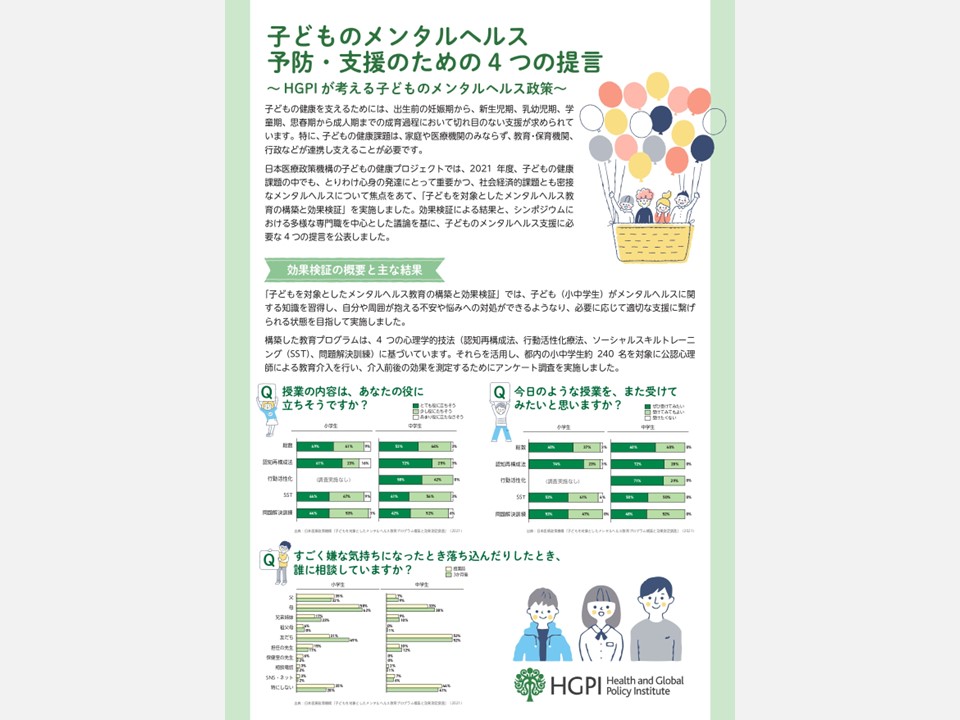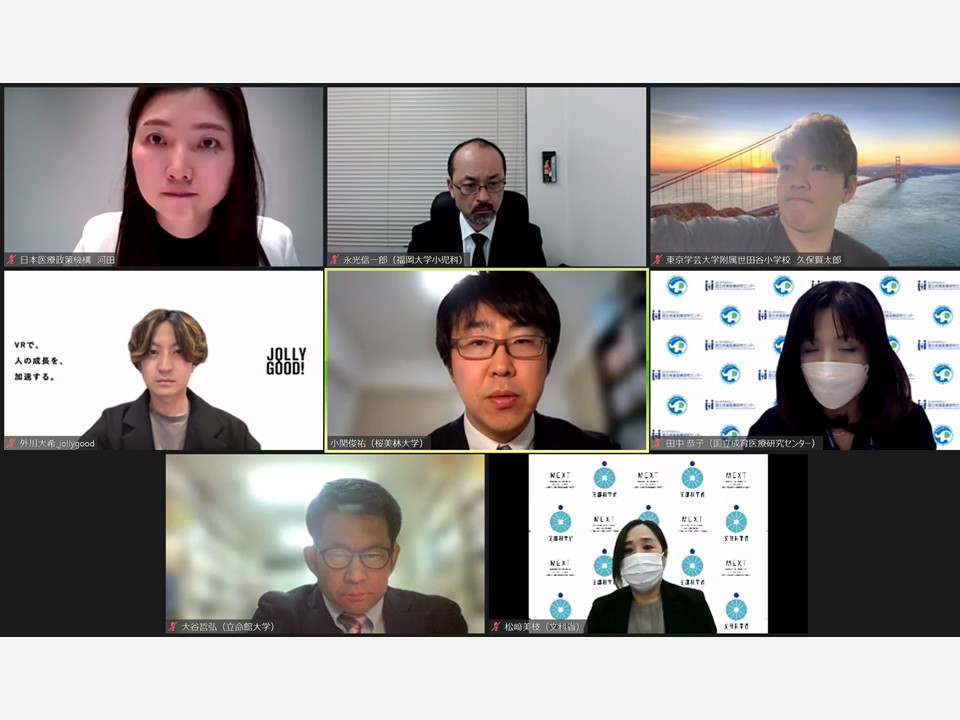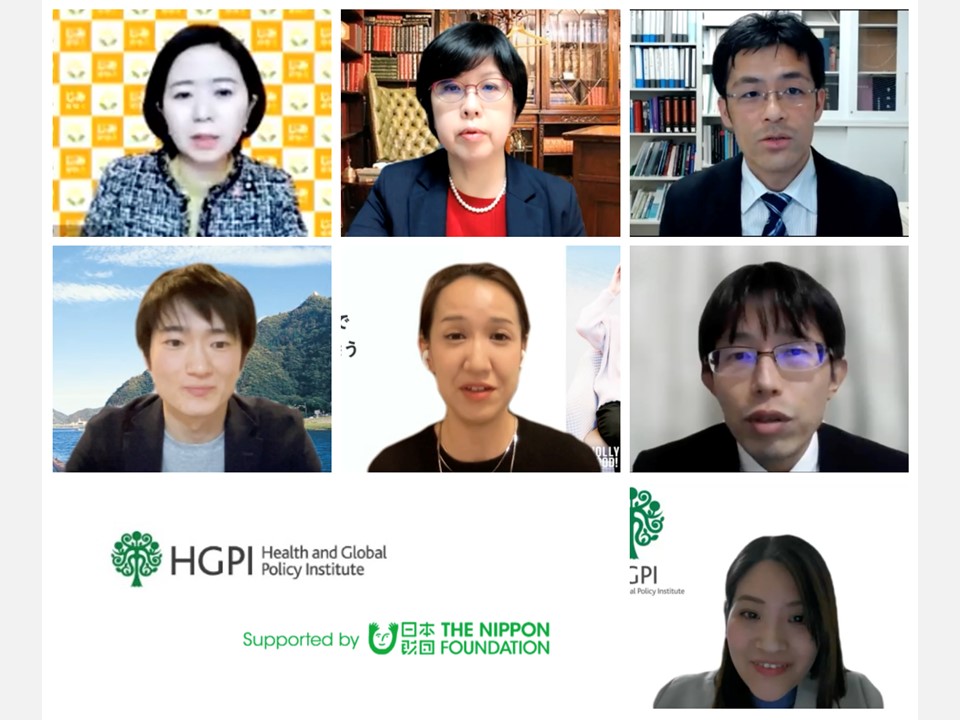[Research Report] Building a Mental Health Program for Children and Measuring its Effectiveness (June 16, 2022)
date : 6/16/2022
Tags: Child Health, Mental Health
![[Research Report] Building a Mental Health Program for Children and Measuring its Effectiveness (June 16, 2022)](https://hgpi.org/en/wp-content/uploads/sites/2/ch-survey-202206-top_JPN-2.jpg)
The Health and Global Policy Institute (HGPI) Child Health Project has presented a report on “Building a Mental Health Program for Children and Measuring its Effectiveness.”
The state of healthcare surrounding children has recently emerged as a major theme among healthcare policy issues. All pregnant and nursing mothers require seamless medical care, welfare, and support from pregnancy to child-rearing. Children have these same needs throughout the growth process from birth to adulthood. In response to these circumstances, the Basic Law for Child and Maternal Health and Child Development was enacted in 2019 and the establishment of the Children and Families Agency was set for 2023 by Cabinet Decision in December 2021. Expectations are now high for significant movement on the policy front, as well. To help accelerate this social momentum and to contribute to the health of children in Japan, HGPI launched the Child Health Project in 2020. In that project, we have been actively stimulating discussion in collaboration with domestic and international stakeholders and formulating policy proposals based on evidence generated through research.
One of the most pressing health concerns for children that is closely related to socioeconomic issues is mental health. To advance progress in mental health based on knowledge gained from HGPI’s Mental Health Project, which also covers adults, we launched an initiative for children’s mental health in FY2021. In recent years, the health impacts of factors based on social psychological backgrounds like suicide rates and abuse among children in Japan have been growing more severe. Furthermore, children in Japan experience the lowest levels of mental well-being among developed countries. It is said one out of every five children in Japan is living with a mental health problem, meaning it is urgent that measures for mental health are taken. However, compulsory education does not provide sufficient practical education to enable children to acquire specific knowledge and coping skills. To address this, it is urgent a nationwide program is established and implemented.
In response, after collecting opinions from multiple experts, the HGPI Child Health Project constructed a mental health program for elementary and middle school students with the goal of enabling children to be able to take preventive action for mental health. Based on that program, we held educational interventions for approximately 240 elementary and middle school students in Tokyo and conducted surveys before and after the intervention to measure its effects. We also held two expert meetings with multi-stakeholders representing industry, Government, academia, and civil society where we examined policy issues surrounding children’s mental health and concrete measures to address those issues.
The results of this project showed there is a clear need for mental health education among elementary and middle schoolers as well that educational interventions are effective. It also showed the need for support related to mental health, the need for educational opportunities to learn about prevention in schools, and the need to promote policies in children’s mental health that cut across ministries and agencies and are based on a life course approach.
■Notable findings regarding the effectiveness of mental health educational interventions for elementary and middle school students
Elementary and middle school students’ needs for education on mental health
- 93% of the elementary school students and 96% of the middle school students said they could imagine themselves actually applying what they learned during the mental health education program, while 90% of the elementary school students and 96% of the middle school students said, “I think it will be useful.”
- When asked if they would like to take similar classes on mental health again, 97% of the elementary school students and 100% of the middle school students replied that they would.
Effectiveness of mental health education among elementary and middle school students
- Three months after the program, among the elementary and middle school students who said they had experienced painful feelings since taking the class, about 40% to 50% of students said they were able to handle those feelings well.
- When asked if they thought they had helped a family member or friend in need during the three-month period after the class, about 80% of the elementary school students and approximately 40% of the middle school students said they had been able to help.
Elementary and middle school students’ needs regarding mental health support
- When asked about current worries or concerns, the most frequent answers among both the elementary and middle school students were “The future” and “COVID-19.”
- When asked about people they could consult, “Friends” and “Parents” were popular responses among both the elementary and middle school students. However, “I don’t consult anyone” was almost as popular (three months after the program, it was selected by 28% of the elementary school students and 41% of the middle school students), indicating the students are experiencing worries or concerns in secret.
As part of this project, we also created a pamphlet that describes methods of skillfully handling stress and providing support that can be used by school-age children, their parents or guardians, school teachers, and other people in positions that provide various types of support to children.
The full report and the pamphlet are published in Japanese only.
Top Research & Recommendations Posts
- [Policy Recommendations] The Path to a Sustainable Healthcare System: Three Key Objectives for Public Deliberation (January 22, 2026)
- [Research Report] The 2025 Public Opinion Survey on Healthcare in Japan (March 17, 2025)
- [Research Report] Perceptions, Knowledge, Actions and Perspectives of Healthcare Organizations in Japan in Relation to Climate Change and Health: A Cross-Sectional Study (November 13, 2025)
- [Policy Recommendations] Reshaping Japan’s Immunization Policy for Life Course Coverage and Vaccine Equity: Challenges and Prospects for an Era of Prevention and Health Promotion (April 25, 2025)
- [Research Report] The 2023 Public Opinion Survey on Satisfaction in Healthcare in Japan and Healthcare Applications of Generative AI (January 11, 2024)
- [Research Report] AMR Policy Update #4: Cancer Care and AMR (Part 1)
- [Public Comment Submission] “Assessment Report on Climate Change Impacts in Japan (Draft Overview)” (December 24, 2025)
- [Policy Recommendations] Developing a National Health and Climate Strategy for Japan (June 26, 2024)
- [Research Report] The Public Opinion Survey on Child-Rearing in Modern Japan (Final Report) (March 4, 2022)
- [Research Report] Survey of Japanese Physicians Regarding Climate Change and Health (December 3, 2023)
Featured Posts
-
2026-01-09
[Registration Open] (Hybrid Format) Dementia Project FY2025 Initiative Concluding Symposium “The Future of Dementia Policy Surrounding Families and Others Who Care for People with Dementia” (March 9, 2026)
![[Registration Open] (Hybrid Format) Dementia Project FY2025 Initiative Concluding Symposium “The Future of Dementia Policy Surrounding Families and Others Who Care for People with Dementia” (March 9, 2026)](https://hgpi.org/en/wp-content/uploads/sites/2/dementia-20260309-top.png)
-
2026-02-05
[Registration Open] (Webinar) The 141st HGPI Seminar “Current Status and Future Prospects of Korea’s Obesity Policy: Voices of People with Lived Experience in Policy Promotion” (March 3, 2026)
![[Registration Open] (Webinar) The 141st HGPI Seminar “Current Status and Future Prospects of Korea’s Obesity Policy: Voices of People with Lived Experience in Policy Promotion” (March 3, 2026)](https://hgpi.org/en/wp-content/uploads/sites/2/hs141-top-1.png)
-
2026-02-06
[Research Report] AMR Policy Update #5: Cancer Care and AMR (Part 2)
![[Research Report] AMR Policy Update #5: Cancer Care and AMR (Part 2)](https://hgpi.org/en/wp-content/uploads/sites/2/HGPI_20260204_AMR-Policy-Update-5.png)







